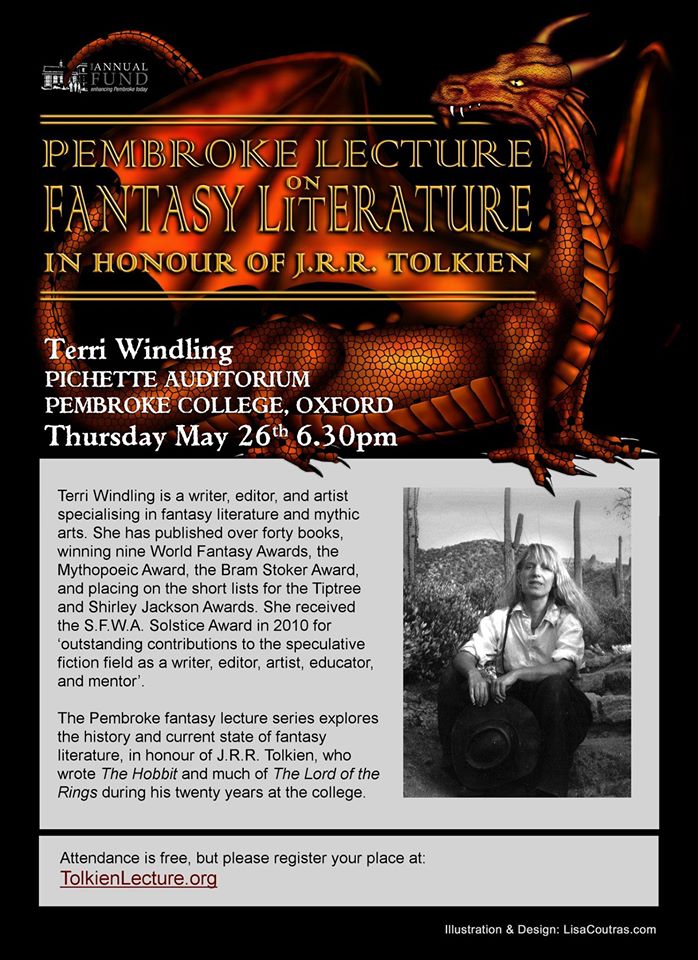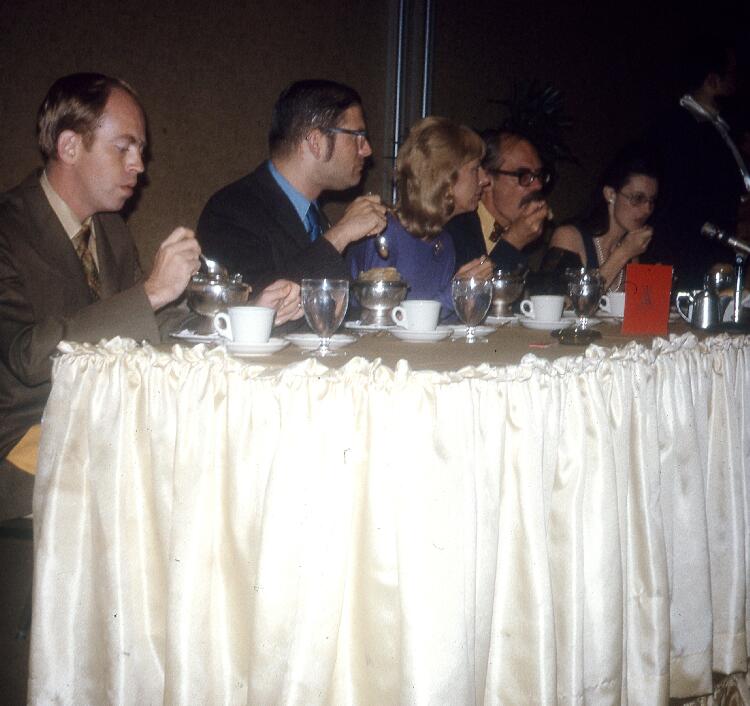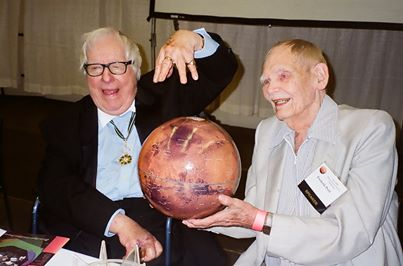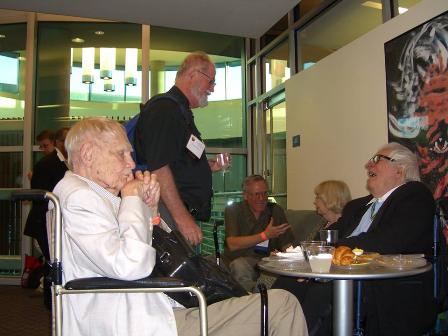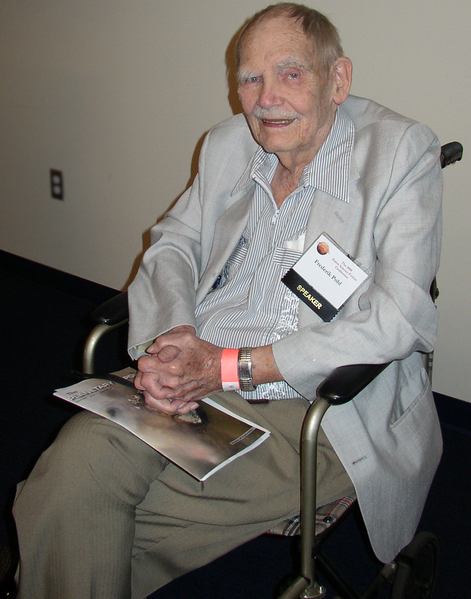(1) JEOPARDY! Funny how fandom has gone from being the contestants to being the answers…. On the May 3 episode of Jeopardy! one of the answers was —
In A Storm of Swords, he acknowledged “Phyllis, who made me put the dragons in it.”
The correct question would be “Who is George R.R. Martin?” But the clue is Phyllis Eisenstein.
Martin discussed this on a panel at Chicon 7 in 2012.
The dragons were one aspect that I did consider not including. Very early in the process, I was debating, should I do this just as like historical fiction about fake history, and have no actually overt magic or magical elements, but — my friend Phyllis Eisenstein, a wonderful fantasy writer who lives here in Chicago, I happened to be talking to her at very early stage in the process. Phyllis has written some great fantasies herself. She said, “Nah, you have to have dragons. It’s a fantasy, you know!” And I dedicated A Storm of Swords to Phyllis, who made me put the dragons in, and I think that was the right thing to do.
(2) TERMS OF UNDEARMENT. Kukuruyo’s image of Ms. Marvel has been pulled from DeviantArt. And on his own site, the Project Wonderful ads have been pulled on the page that displays the image. Did he violate the Terms Of Service?
https://twitter.com/kukuruyo/status/727512929415864320
(3) OFF THE CHARTS. The map found in illustrator Pauline Baynes’ copy of The Lord of the Rings has a new home reports The Guardian — “Tolkien annotated map of Middle-earth acquired by Bodleian library”.
Here be dragons – and wolves, bears, witches, camels, elephants, orcs, elves and hobbits.
A map of Middle-earth, which to generations of fans remains the greatest fantasy world ever created, heavily annotated by JRR Tolkien, has been acquired by the Bodleian library in Oxford to add to the largest collection in the world of material relating to his work, including the manuscripts of The Hobbit and The Lord of the Rings trilogy.
The annotations, in green ink and pencil, demonstrate how real his creation was in Tolkien’s mind: “Hobbiton is assumed to be approx at latitude of Oxford,” he wrote.
(4) CLIMB EVERY MOUNTAIN. BBC News has a story about a a member of the 501st climbing England’s highest mountain. A Star Wars fan who walked to the tops of Snowdon and Ben Nevis while dressed as a stormtrooper plans to tackle England’s tallest mountain.
Ashley Broomhall hopes to make the trek on Wednesday, the date of which – May the fourth- is often linked to the Star Wars phrase “May the force…”
He will wear his stormtrooper armour for the walk up 3,208ft (978m) Scafell Pike in the Lake District.
(5) AMAZONIAN TOSSER. Heather Rose Jones “tosses a little numbers-geekery” at the question of what it means for a book to have only really really good reviews on Amazon. (Spoiler: She says it means your book isn’t getting out enough.)
You know who has spent a very long time in the top 10 books sold in Historical Fantasy? Diana Gabaldon’s Outlander. Do you know how many one-star reviews Outlander has on Amazon? 749. Seven hundred and forty-fucking-nine one-star reviews (4% of the total). No book is universally beloved.
(6) CHINA BOUND. Martin L. Shoemaker posted his good news on Facebook:
Now that the contract has been signed, I am very honored to announce that “Today I Am Paul” will appear in Science Fiction World, the Chinese science fiction magazine, as part of their new series of Hugo/Nebula nominees.
(7) CROWDFUNDING AEROSPACE HISTORIAN. You can support Dr. Jim Busby by helping fund his travel to Spacefest VII.
Help Us Keep Our Aerospace Heritage Alive
From June 9 – 12 2016 Spacefest VII , a reunion of legendary NASA astronauts, engineers, famous space scientists, authors, astronomers, space artists, and fans produced by Novaspace, will be held in Tucson, AZ.
Dr. Jim Busby Aerospace Historian, educator and board member of Aerospace Legacy Foundation (ALF) in Downey, CA has been invited to be a guest lecturer and to do a memorabilia display. Unfortunately, ALF being a small non-profit organization cannot afford to send Dr. Busby, his wife and other members of the organization to Tucson. That is why we are turning to aerospace enthusiasts to help fund this trip. Dr. Jim Busby’s extensive knowledge of aerospace history has educated many over the years. In 1978 he helped create the world’s first Apollo lunar reenactments and worked at the California Science center for 19 years.
“I enjoy educating children and adults in our long fascination with space exploration,” Busby commented. “Inspiring children when I talk about Apollo lunar exploration is an experience beyond words.”
The GoFundMe has raised $645 of its $2,500 goal at this writing.
(7) JURY DUTY. Mary Anne Mohanraj announced on Facebook that jurors are needed to review grant applications for Speculative Literature Foundation.
JURORS NEEDED: The Speculative Literature Foundation is looking for ten volunteer jurors willing to read applications (a few pages each, including a writing sample) over the space of about a month for our Diverse Writers Grant and our Diverse Worlds Grant. The grant deadline is at the end of July, so you would need to have time available in August to read and discuss. In order to be considered, potential jurors should be writers, editors, teachers, or readers with broad knowledge of the genre, who are capable of judging literary quality in a work.
If interested, please send a brief note to our director, Mary Anne Mohanraj, [email protected], with the subject line: JUROR. Include a few lines on what your qualifying background would be for serving as a juror. Thank you for your interest, and for your support of science fiction and fantasy!
More information about the Diverse Writers and Diverse Workds grants at the link.
(8) SOUND RETREAT. John C. Wright takes “A Polite Retreat from Combat”.
Mr. George R.R. Martin here (http://grrm.livejournal.com/485124.html) has taken the time out of his busy writing schedule to rebut my comment where I rebuked him for characterizing the Sad Puppies reading list of last year as ‘right-wing’ and ‘weak’, a statement published in the Guardian newspaper.
My reply, humbly enough, was that my work was unweak enough to have sold at least one example to him. He responds by chiding me for being insufficiently humble: as if making a sale to George R.R. Martin were not indeed a matter for pride.
He and I (or so I thought) had an agreement to smooth over our puppy-related sadness.
In the spirit of that agreement, I plead nolo contendere to his allegations, in the hope that if I say nothing but this in reply, he will return to his writing, and tell me and his other fans the final fate of Westeros.
The years fly like autumn leaves, and life too short for such fare. Winter is coming.
(9) RITUALLY UNCLEAN. Sami Sundell calls it “Overemphasizing the Taint”.
…I’ve also seen some more dire messages. For example, Steve Davidson listed nominations sans puppy taint. Matthew M. Foster had an even stricter stance and called the awards Vox Awards. And that’s what really hit my nerve….
So who cares if one of the nominees is Ann Leckie‘s Ancillary Mercy, the final part of the trilogy that started with Hugo winner Ancillary Justice – a book that has been much reviled by the Puppies. Mercy was on Sad Puppies recommendation lists so it’s tainted. Same apparently goes for Uprooted by Naomi Novik.
And Vox Day, apparently all by himself, decided Seveneves by Neal Stephenson is worthy of a Hugo nomination. You know, the multiple award winner Neal Stephenson? And a book that was pre-emptively put into mind blowing science fiction list of io9 in January 2015? Expectations were high, and I’ve seen plenty of reviews saying those expectations were met, and then some.
Same goes for Alastair Reynolds’ Slow Bullets and Lois McMaster Bujold‘s Penric’s Demon. McMaster Bujold has won or been nominated for Hugos more times than I have fingers. Is it really so hard to believe she would write yet another masterpiece?
…No. Saying Day made some OK choices is not surrender. That blog entry is surrender. It gives all the power to Vox Day, it ignores the quality of works, and it claims fans had no say in the nominations. That sounds awfully lot like the arguments we’ve heard from Puppies for several years….
(10) TROLLFIGHTING SPACE KITTEN. Spacefaring Kitten would deal with the ballot this way — “On Fighting Trolls and Going to Have to Ask Kevin Standlee”.
Rule changes are slow, however, so they don’t help in the current situation — where we indeed have a hostile takeover by trolls who have stated explicitly that their intention is to destroy the award. Among the Hugo finalists, there are works that include blatant hate-speech, fat-shaming, misogyny et cetera. Overall, it’s more horrible than last year, when the voters had to mostly just stomach bad writing (this year, the level of writing is probably much higher).
The works I’m referring to here are of course the short story “If You Were an Award, My Love” and the related works SJWs Always Lie, “The Story of Moira Greyland” and “Safe Space as Rape Room” (and maybe the work of the fan artist “Kukuruyo”). These are ugly works manufactured to harass individual members of the SFF community or groups of people that the Rabid Puppies contingency happens to love harassing (women, LGBTI community and so on).
So, what could be done about them? Unfortunately, not much.
After reading the WSFS constitution, I came up with only two things. If I was running the Worldcon (which I’m not, of course), I would:
- Not include them in the Hugo voter packet. (There are zero rules about the voter packet, so it would be completely possible for the Worldcon to exclude the works mentioned above.)
- Insert onto the online voting form a statement that says “Midamericon II condemns the hate-speech/whatever featured in Finalist X”.
(11) SUTHERLAND CONTINUES. Meanwhile, Doris V. Sutherland is still working on her category-by-category discussion of last year’s results in “2014 Hugos Versus 2015 Sad Puppies: What Could Have Been, Part 1” at Women Write About Comics.
So, let me restate that the works on these longlists are the works that received the highest number of votes during the Hugo nomination process without being on either the Sad Puppies or Rabid Puppies slates. I have seen no evidence to justify suspicion of any conspiracy or wrongdoing on the part of George R. R. Martin or anyone else involved.
That said, I also have to question the claim made by certain Sad Puppies opponents that these longlists show us exactly what the Hugo ballot would been had the Sad Puppies campaign never existed. This interpretation ignores the fact that some of the Puppy picks could quite conceivably have made the final ballot even without the aid of the campaign. Nevertheless, a look at the longlist will at least give us a good idea of how the ballot would have looked without Puppy slating—and an idea is all we can have.
Best Short Story
“Jackalope Wives,” by Ursula Vernon
One of the 2014 nominees in this category was Sofia Samatar’s “Selkie Stories are for Losers,” which riffed on the folkloric motif of the animal bride. Interestingly enough, one of the contenders for the 2015 award plays with the same theme—albeit with very different results.
Ursula Vernon constructs her pseudo-folkloric story from specifically American materials, lending it a folksy tall-tale feel. It takes place in a world where young men periodically go out and hunt for jackalopes—which, in Vernon’s conception, are more than just antlered bunnies. Once they remove their fur, they take on their true forms as beautiful, unearthly women. As per animal bride tradition, any prospective suitor must steal a jackalope’s fur before he can win her as a bride, and burn it to prevent her from changing back and escaping.
So far, so conventional. But while folktales of this type are often told from the point of view of the man, with the bride’s disappearance seen as a sad occurrence, Vernon sheds light on how rotten the scenario must be for the woman. The protagonist of “Jackalope Wives” learns the ugly truth behind the legend when he tries to burn a jackalope’s fur; her resulting screams of pain cause him to have second thoughts, inadvertently leaving the woman trapped halfway between human and animal. The manic pixie dream girl has had her wings cut off.
“Jackalope Wives” is true to its folkloric roots while simultaneously offering a contemporary spin on the age-old material. A deserving contender for Best Short Story.
Sutherland also drew a “salute” to GamerGate Life.
I drew this in honour of #Gamergate Life's recognition at the #HugoAwards. pic.twitter.com/XGNwWESUYn
— Doris V. Sutherland (@DorVSutherland) May 3, 2016
(12) AGAINST HATRED. Jon Tully at GeeksOut tells “How Hatred Is Hurting the Hugos”.
…This year, the Rabid puppies doubled their votes and succeeded in nominating 62 out of 80 stories that they backed. And are these stories that reflect where our culture is headed? Are they stories about inclusivity, empathy, and reflection?
No. They are stories such as “SJWs Always Lie: Taking Down the Thought Police” a story about “social justice warriors” (penned by Beale himself), “If You Were an Award, My Love” by Juan Tabo and S. Harris, (a direct spoof on the gay-affirming “If You Were a Dinosaur, My Love”), “Safe Space as Rape Room” by Daniel Eness (published by Castalia House) and, my personal (sarcastic) favorite, Space Raptor Butt Invasion by Chuck Tingle, which has all the literary merit the title suggests.
If the judges were willing to deny awards in five categories last year, what is it going to look like this year? Will any awards be given? Will authors begin to gravitate away from the Hugos towards the Nebula or the Locus Awards?
Will this be the death of an institution I love?
As Edmund Burke once said, “The only thing necessary for the triumph of evil is for good men to do nothing.” And while these oft-repeated words can seem passé (and a little too gender-specific), there is, of course, a core of truth. The reason that we’re in this situation is because the various Puppies were able to rally enough hate to their side to be heard.
But the fact that sours my stomach is not that small-minded children were able to throw a tantrum and get their way, it’s that, by doing so, they’re hijacking the narrative of our era. Metaphorically speaking, the Rabid Puppies are wedging their intolerance into a time capsule that future generations will open, and societies not yet born will see and be ashamed of.
(13) WORD BALLOONS. At this link you will find what seems to be popularly regarded as “the best superhero story ever.” And at minimum it’s pretty funny: http://imgur.com/a/czaDD
(14) FLIGHT TO THE FINNISH. Zen Cho can’t resist temptation.
In the half day I've been on Finnish soil I've bought so many Moomin things I feel slightly alarmed at myself. pic.twitter.com/KVsMg29vCE
— Zen Cho (@zenaldehyde) May 2, 2016
Temptation is everywhere. Resistance is futile. pic.twitter.com/6mi4LdzRb3
— Zen Cho (@zenaldehyde) May 2, 2016
(15) FRED POHL IS HERE. The Traveler from Galactic Journey has the latest ancient prozine news: “[May 3, 1961] Passing the Torch (June 1961, Galaxy, 2nd Half)”.
Fred Pohl came on last year. He was not officially billed as the editor, but it was common knowledge that he’d taken over the reigns. Pohl is an agent and author, a fan from the way-back. I understand his plan has been to raise author rates again and bring back quality. While he waits for the great stories to come back, he leavens the magazines with old stories from the “slush pile” that happen not to be awful. In this way, Galaxy showcases promising new authors while keeping the quality of the magazine consistent.
The June 1961 Galaxy is the first success story of this new strategy.
Last issue, I talked about how Galaxy was becoming a milquetoast mag, afraid to take risks or deviate far from mediocrity. This month’s issue, the first that lists Pohl as the “Managing Editor,” is almost the second coming of old Galaxy — daring, innovative, and with one exception, excellent.
Take Cordwainer Smith’s Mother Hitton’s Littul Kittons, in which an interplanetary ring of thieves tries to steal from the richest, and best defended planet, in the galaxy. Smith has always been a master, slightly off-center in his style; his rich, literary writing is of the type more usually seen in Fantasy and Science Fiction. Kittons is ultimately a mystery, the nature of the unique (in name and nature) “kittons” remaining unknown until the last. A brutal, fascinating story, and an unique take on the future. Five stars.
(16) DABBLING IN THE DEBACLE. Amanda S. Green asks “What do you want?” at Mad Genius Club.
…the Hugo debacle. Yes, debacle. There is no other way to describe it. Whether you support the idea that the Hugos are a fan award (which I do since you buy a membership to WorldCon in order to vote and anyone with the money can do so) or a “literary” award (which, to mean, would require it to be a juried award in some fashion), I think we all can — or at least should — agree that Hugo should not be exclusionary. If you can afford the money for the membership, you should be able to vote and your vote should have the same weight as the next person’s. Until the rules are changed, that is how it should be.
So imagine my surprise yesterday when I was looking through Facebook and came across a post from one of the puppy-kickers — and I am looking straight at you, Mr. Amazing Stories — saying that the committee should go in and look at all the ballots. Any ballot cast by a puppy should be thrown out. (And he even adds to his comment “screw privacy”, which had been one of the concerns last year’s committee had when they were asked to release the voting data.). But that’s not enough for him. He advocates never letting a “puppy” buy a membership to WorldCon again. There’s more but you can go look for yourself — assuming the post is still there. It is dated April 26th and was posted at 7:24 pm.
Needless to say, when I saw this, I didn’t know whether to laugh or cry. Laughter because these sorts of comments show the hypocrisy of those who are “fighting the good fight” against those evil Sad and Rabid Puppies. We are called all sorts of names because, as they claim, we want to exclude message and “marginalized” people from the genre. Yet here one of their most vocal supporters is doing exactly what they claim we are doing. He is saying we should not be allowed into the same room with the Hugos. Note, he is not only saying that we shouldn’t be allowed to vote for their beloved award but tat we should not be allowed to attend WorldCon.
Sounds pretty exclusionary to me. How about you?
(17) HE’S EXCITED. More from Shamus Young about his Hugo nomination in a podcast on his site. The show notes say:
01:08 Shamus is up for a Hugo Award
Here I talk about the fact that I’ve been nominated for a Hugo, and I briefly mention the controversy the Hugos have been having for the past two years. I don’t want to talk about the controversy here. In fact, the no politics post was written specifically in anticipation of this discussion.
If you’re looking for more information: On WIRED there’s this post entitled Sci-Fi’s Hugo Awards and the Battle for Pop Culture’s Soul, which seems to be the one everyone links when trying to bring people up to speed on this. However, like a lot of Wired articles this one feels like the author was paid by the word. It’s long on anecdotes, it takes forever to get to the point, it’s broad and hyperbolic, and for all the words it spends it never feels like it gets down to details.
I found this one much more useful: A Detailed Explanation by Matthew David Surridge, explaining why he declined his Hugo nomination last year. It is also long – I’m afraid you can’t really do the topic justice in a couple of paragraphs – but instead of spending its word count on stories, he just takes up one side and argues for it. In the process he kind of maps out a good deal of both sides[1].
I’m excited to be nominated for a Hugo. I’m excited that videogames are being recognized and encouraged in their pursuit of sci-fi stories. I’m dreading dealing with people who don’t respect my no politics rule and are just looking for an opportunity to unleash the anger they’re hauling around. I think accepting the nomination is the most diplomatic thing to do, and win or lose I’m grateful for everyone who thinks my work has merit.
(18) COUNTING TO ZERO. The Locus Awards navigated around the worst rocks and shoals of the puppy lists only to incur criticism about the composition of the YA Novel finalists.
Surprise, welcome to Systemic Sexism, Locus Awards edition!!
— Renay? (@renay) May 3, 2016
Just to clarify the poll is based on the Locus Recommended Reading List–readers choose the finalists for the awards. (Still a problem.)
— Gwenda Bond ?????The Frame-Up????? out now (@Gwenda) May 3, 2016
https://twitter.com/stephandrea_/status/727625334120583169
Hey, if you read LOCUS, don't worry: women do actually write fantasy and science fiction, even if they didn't make any awards lists.
— Martha Brockenbrough FRANK AND THE BAD SURPRISE (@mbrockenbrough) May 3, 2016
(19) NEW POPULAR FICTION MFA. Emerson College in Boston is starting a new Masters of Fine Arts in Popular Fiction Writing and Publishing in Fall 2016. It will be a fully online program designed for students who want to pursue a career as a writer of novels in the genres of fantasy, science-fiction, horror, mystery, thriller, or young adult.
The program will enroll a cohort of 12 students in order to provide individual attention and coaching. The two-year accredited MFA program will be housed in Emerson’s nationally known Department of Writing, Literature and Publishing.
The MFA in Popular Fiction Writing and Publishing is one of the first online writing programs to prepare students to write professional-level stories and novels in a variety of fictional genres and provides an opportunity for students to read deeply, think critically, and discuss popular fiction with peers. Students will have the experience of participating in creative workshops and literature courses that focus on the history of various popular genres. Additionally, hands-on publishing courses will teach students how to turn a completed manuscript into a polished, publishable work. Emerson’s publishing faculty will offer insights on the avenues available for students to publish their work, from finding and working with literary agents to self-publishing to reaching a wide readership through trade publishers.
For more information, visit the MFA in Popular Fiction Writing and Publishing web page or contact John Rodzvilla, graduate program director, at [email protected] or 617-824-3717.
(20) PUPPY DISAMBIGUATION. Don’t miss the rollover in Trae’s cartoon “The inevitable outcome”.
(21) UNKNOWN TRAILER. The first trailer for Approaching the Unknown has been released, a movie starring Mark Strong and Luke Wilson.
(22) TOLKIEN TALK. Terri Windling will lecture about Tolkien in Oxford on May 26.
(23) PAYING BACKWARD. Rachel Swirsky has a plan for getting through these parlous times which she shares in “Making Lemons into Jokes: ‘If You Were a Butt, My Butt”.
In my family, humor has always been a way of putting crap into perspective. When life hands you lemons, make jokes. And then possibly lemonade, too. It is coming up on summer.
In that spirit, I’m trying a self-publishing experiment. And that experiment’s name is “If You Were a Butt, My Butt.”
If my Patreon reaches $100 by the end of the month, I will write and send “If You Were a Butt, My Butt” to everyone who subscribes. If things go well, I’ve got some stretch goals, too, like an audio version.
I will be donating the first month’s Patreon funds to Lyon-Martin health services. Lyon-Martin is one of the only providers that focuses on caring for the Quiltbag community, especially low-income lesbian, bisexual, and trans people. They provide services regardless of the patient’s ability to pay.
[And that’s the end! Thanks to John King Tarpinian, James David Nicoll, Mark-kitteh, DMS, Chip Hitchcock, Cat Rambo, Hampus Eckerman, Mike O’Donnell, Glenn Hauman, and Michael J. Walsh for some of these stories. Title credit goes to File 770 contributing editor of the day Soon Lee.]

